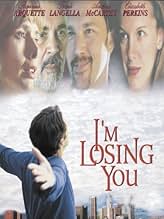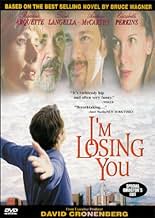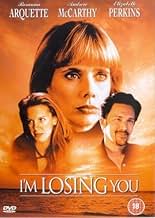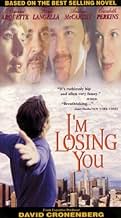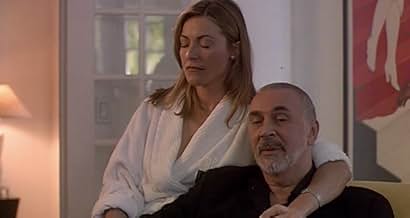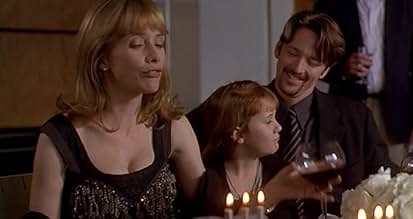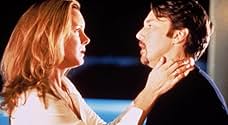Aggiungi una trama nella tua linguaNearing his 60th birthday, a movie producer discovers that he may have less than a year to live as a result of inoperable cancer. The effects of his disease take the toll on him and his dist... Leggi tuttoNearing his 60th birthday, a movie producer discovers that he may have less than a year to live as a result of inoperable cancer. The effects of his disease take the toll on him and his distressed wife. However, his dysfunctional family are not told and their soap opera-ish life ... Leggi tuttoNearing his 60th birthday, a movie producer discovers that he may have less than a year to live as a result of inoperable cancer. The effects of his disease take the toll on him and his distressed wife. However, his dysfunctional family are not told and their soap opera-ish life goes on. His son, a has-been actor, has to deal with a precocious daughter and a drug-addl... Leggi tutto
- Premi
- 1 vittoria in totale
Recensioni in evidenza
Wagner's 1996 novel "I'm Losing You" was described by John Updike as "inhabiting a universe so cratered it's hard to turn the pages." The novel is a Boschian cry of despair from the bowels of Century City. In his new movie version, that Munchian shriek is turned into a soft, Cronenbergian whisper. The has-beens and never-weres of Wagner's ultimate dystopian L.A. are viewed not with sadomasochistic coolness here, but with gentleness and, dare I say it, love. There's nothing sentimental in this picture, and not a frame that isn't perfumed by death, but there is a quality that took me off guard. I'M LOSING YOU is a reminder, almost inaudible in this cratered blockbuster universe, of the humanistic potential of movies--the possibility of art as a guide for human beings to navigate their way out of hopeless predicaments. The insider edge is off the movie; unlike the book, it isn't about the perfectly poised name-drop. The movie might as well be taking place in Ohio: the substance of it is in its insight into beleaguered characters trying to buttress themselves with fame and money against catastrophes that claim the Hot 100 and Joe Nobody alike.
Wagner has assembled the strongest ensemble cast since BOOGIE NIGHTS. Rosanna Arquette is a strange overlap of the luminous and the feral as an art evaluater who makes a melodramatic discovery about her roots that leads to a reconnection with a mystical Jewish practice. Andrew McCarthy, as a fallen eighties actor, goes places you wouldn't imagine him capable of--he suggests a warmer, less remote Edward Norton. As a fortyish Hollywood rich kid who's HIV-positive, Elizabeth Perkins fairly scorches a hole in the movie--the rage of a magnificent woman pushed out of the box before her time lights up every scene she's in. And Amanda Donohoe, Buck Henry and Laraine Newman all have potent brief moments.
The pitfall to Wagner's genius is generally that he uses his gift for conjuring catastrophe only cruelly--it sometimes feels as if there's no possible response to his books except to faint. Here, he's put that talent to use: he questions the tactics we use to deal with the undealable. In a stroke of ill fortune endemic to the characters in Wagner's books, I'M LOSING YOU was released on the same day as EYES WIDE SHUT and THE BLAIR WITCH PROJECT. I can only hope someone within the sound of my voice will see this beautiful, almost-great movie before, like its characters, it passes into the ether.
The basic problem with the film is that we don't care much for these characters. They seem to have everything, but yet, they are incapable of connecting with one another. The revelation at the beginning of the film about Perry's grave illness doesn't bring his family to bond with one another in the face of what the future will bring.
The son Bertie is an aspiring actor who is going through a rough period in his life. Tragedy strikes in a way he didn't expect, yet, this man doesn't seem to register any emotion. The adopted girl, Rachel, gets too deep into an area that might give her closure with his dead parents. AIDS enters the picture in the form of Aubrey, the beautiful woman who is also having her own crisis in dealing with her reality.
Frank Langella, as Perry does a good job in his take of the rich man facing his own mortality. Andrew McCarthy tries his best to convey a certain degree of decency to his Bertie. Rosanna Arquette has one of the best opportunities in the film. Elizabeth Perkins's Aubrey is not seen too long for us to care enough for her. Salome Jens, an under used actress plays Perry's wife Diantha. Buck Henry, Amanda Donohue, Ed Begley Jr, and the rest of the cast make adequate contributions to the film.
Ultimately, the film, as presented by Mr. Wagner feels empty because we don't connect to these people at all.
Which would have been fine if this film had been the great meditation on death and dying that it so obviously wants to be. Maybe there just wasn't enough time to thoroughly develop all the characters and plot elements, but I surely wouldn't have wanted a longer film. Consequently nothing in it really reached or impressed me. Particularly poorly handled, I thought, was Rosanna Arquette's character, whose mental breakdown and interest in/obsession with with a Jewish funeral ritual were not very well-explained, at least not to my satisfaction. The ritual, by the way, was interesting from a cultural and educational point of view, but as a part of the film it was my least favorite. I disliked Julie Ariola's pious character every time she was on the screen, for some reason. And I found myself again wondering why Arquette has such a hard time finding roles that are worthy of her.
Apparently many people found this film edifying, but I would proceed with caution. One thing proponents and detractors alike could probably agree on: if you're looking for a tear-jerker, go elsewhere. There probably wasn't a wet eye in the house when this film was playing.
Why isn't the movie as good as the book? There are too many reasons to list. Bad casting, the movie lacks the humor of the book, key scenes in the book aren't in the movie, etc. Pretty typical stuff.
If you've read the book, it might be worth it to see the movie though. It's almost unwatchable, but you might want to tough it out just so you can puzzle over it and ask: "What was Bruce Wagner thinking?"
Lo sapevi?
I più visti
- How long is I'm Losing You?Powered by Alexa
Dettagli
Botteghino
- Lordo Stati Uniti e Canada
- 13.996 USD
- Fine settimana di apertura Stati Uniti e Canada
- 7027 USD
- 18 lug 1999
- Lordo in tutto il mondo
- 13.996 USD
Contribuisci a questa pagina



